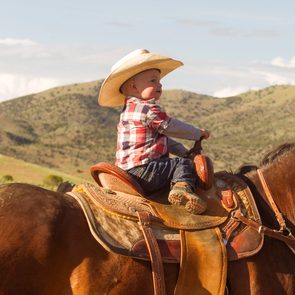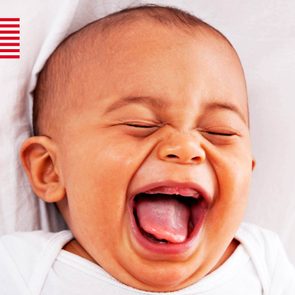This is definitely one way to ensure your kid stands out from the crowd!

These Are the Rarest Baby Names in Each State

All parents long for a baby name that feels special yet also matches their sensibility and flows nicely with a middle and last name. Traditionalists will stick with classic baby names (Emma, Olivia, James, Henry), while others will hop on a trend, choosing a cool gender-neutral name or maybe an interesting double-barrel moniker. But if you’re itching for something truly extraordinary, the latest baby-name news might be right up your alley.
We’re about to take you on a tour of the absolute rarest baby names in the country, compiled by childcare agency Go Au Pair. The state-by-state analysis is eye-popping, and it includes many highly unusual names you may have never considered—but might now! Read on for more about which baby names made the list and what to know if you’re leaning toward a similarly unique choice.
Get Reader’s Digest’s Read Up newsletter for more baby names, humor, cleaning, travel, tech and fun facts all week long.
How were these rare names determined?
The list of rare names was determined by Go Au Pair with the Social Security Administration’s (SSA) public database of names given to babies born between 2000 and 2023. Each state’s rarest name, plus the one from the District of Columbia, were counted and compared with how unusual they are across the U.S.
For example, just five babies sport the rarest name Kendly—and all of them happen to live in Florida. But in Kentucky, Eleia is the most unusual name, though more have it nationwide. Of the 125 babies named Eleia in this time frame, just 4% reside in the Bluegrass State. One caveat: To safeguard citizens’ privacy, SSA only releases names that are used five or more times in each part of the country.
What is the rarest name in the U.S.?

There’s actually an 11-way tie for the rarest name in the United States. As mentioned above, five is the cutoff, and there are 11 states with this number. Among these are the Aloha State’s Lehiwa, a name that means admirable or attractive in Hawaiian; Hudes, the rarest name in New York that translates from Hebrew as “God is my light;” and Taslin in Texas, which has Arabic or Turkish roots and means calm or peaceful. Fun fact: The rarest names in the U.S. don’t appear elsewhere in the country—they’re all in this small group of 11 states.
And that’s what makes them all the more special. “For new parents, their baby is the center of their world and the light of their lives—and who wouldn’t want a name to reflect that?” says Rebekah Wahlberg, a specialist in baby-name trends at BabyCenter who was not involved in the Go Au Pair study. Rare baby names grab attention, and parents want their baby to stand out in a crowd, she adds.
What are the rarest names in each state?
Here are the rarest names alphabetically by state, as well as how many babies have it nationwide:
- Alabama: Zaykeese (13)
- Alaska: Atigun (5)
- Arizona: Noname (11)
- Arkansas: Maziyah (205)
- California: Alique (5)
- Colorado: Aristea (76)
- Connecticut: Nayeliz (179)
- Delaware: Naim (1,549)
- District of Columbia: Meklit (474)
- Florida: Kendly (5)
- Georgia: Nyyear (99)
- Hawaii: Lehiwa (5)
- Idaho: Moroni (255)
- Illinois: Kotryna (5)
- Indiana: Nymeir (34)
- Iowa: Brex (104)
- Kansas: Macklyn (301)
- Kentucky: Eleia (125)
- Louisiana: Ryda (5)
- Maine: Winner (212)
- Maryland: Danera (5)
- Massachusetts: Jadalys (6)
- Michigan: Fatme (10)
- Minnesota: Sabarin (5)
- Mississippi: Johneisha (40)
- Missouri: Carmya (20)
- Montana: Treysen (320)
- Nebraska: Halsey (329)
- Nevada: Eluney (113)
- New Hampshire: Babyboy (952)
- New Jersey: Mariaeduard (11)
- New Mexico: Charmayne (78)
- New York: Hudes (5)
- North Carolina: Aryya (22)
- North Dakota: Cauy (155)
- Ohio: Firman (12)
- Oklahoma: Daycee (47)
- Oregon: Trask (31)
- Pennsylvania: Pater (6)
- Rhode Island: Jahziel (883)
- South Carolina: Tradd (8)
- South Dakota: Wicahpi (6)
- Tennessee: Kavious (27)
- Texas: Taslin (5)
- Utah: Arikka (5)
- Vermont: Wylder (1,873)
- Virginia: Lakhi (37)
- Washington: Chelan (6)
- West Virginia: Haylea (480)
- Wisconsin: Yuepheng (51)
- Wyoming: Mazikeen (1,236)
What is the trend with these rare names?
There are a few overarching trends we can suss out here, though not one major one that encompasses the whole country. The first one to note is the names with the letter z, like Mazikeen, Jahziel, Nayeliz, Maziyah and Zaykeese, a hot trend for 2025. Creative spellings, often with the letter y, are represented in a big way too, with Kotryna, Wylder, Aryya, Charmayne, Carmya, Ryda and Haylea. And a double-barrel name shows up here—Mariaeduard, a name that may have lost its hyphen when recorded.
Certain states also feature rare names that dovetail with the people residing there. For example, Sabarin, a name with Arabic roots, pops up in Minnesota, a state with many Arab Americans, and the Hebrew name Hudes makes an appearance in New York, which has the most Jews in the world outside of Israel. And then there’s Wicahpi, Lakota for star; of the six tots with this Indigenous name, 83% live in South Dakota, which is where this First Nation is originally from.
Wahlberg also notes the heritage theme, as “Fatme and Naim have Arabic origins and are likely used by people to honor family roots.” But inspiration can come from all over, she continues: “Johneisha is likely a feminine twist on John, while Wylder is simply a variant spelling of the surname Wilder.”
Are people really giving their children names like Noname and Babyboy?
You probably noticed Noname (Arizona) and Babyboy (New Hampshire) on the list and wondered whether people are seriously giving these names to their children. While it’s possible a mom or dad decided to pick it, these “names” are very likely placeholders, says Wahlberg. You have to make a decision regarding your baby’s name in the hospital, but some parents are torn and put in a word just to fill the box.
“The SSA must experience these placeholders often because BABY, BABYBOY, BABYGIRL, BABY BOY, BABY GIRL, INFANT, NONAME, NO NAME, TEST, UNK, UNNAMED, UNAMED, UNAME [and] VOID are specifically required to be filtered out before they can assign a social security number,” explains Wahlberg. BabyCenter does the same, she adds, removing placeholder name like these before they analyze data.
What should you keep in mind about choosing very rare names?
When choosing very rare names, know that remarks from others will probably flow fast and furious. Of course, you don’t have to take these opinions into consideration when picking your baby’s name, nor do you owe anyone an explanation—except maybe the baby you give it to, says Wahlberg. “But brace yourself for comments,” she adds, “because they’re bound to come whether you like it or not.”
RELATED:
About the expert
|
Why trust us
At Reader’s Digest, we’re committed to producing high-quality content by writers with expertise and experience in their field in consultation with relevant, qualified experts. We rely on reputable primary sources, including government and professional organizations and academic institutions as well as our writers’ personal experiences where appropriate. We verify all facts and data, back them with credible sourcing and revisit them over time to ensure they remain accurate and up to date. Read more about our team, our contributors and our editorial policies.
Sources:
- Rebekah Wahlberg, specialist in baby-name trends at BabyCenter; email interview, April 2025
- Mental Floss: “The Rarest Baby Name in Each State”



